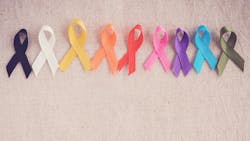Could knowing where your ancestors came from be the key to better cancer treatments? Maybe, but where would that key fit? How can we trace cancer’s ancestral roots to modern-day solutions? For Cold Spring Harbor Laboratory (CSHL) Research Professor Alexander Krasnitz, the answers may lie deep within vast databases and hospital archives containing hundreds of thousands of tumor samples.
Krasnitz and CSHL Postdoctoral Fellow Pascal Belleau are working to reveal the genealogical connections between cancer and race or ethnicity. They’ve developed new software that accurately infers continental ancestry from tumor DNA and RNA. Their work may also help clinicians develop new strategies for early cancer detection and personalized treatments.
Krasnitz’s team trained their software tools using hybrid DNA profiles. They created these profiles from cancerous and unrelated cancer-free genomes of a known background. They then tested the software’s performance against pancreatic, ovarian, breast, and blood cancer specimens from patients with known ancestry. The team found the software matched their hybrid profiles to continental populations with over 95% accuracy.

